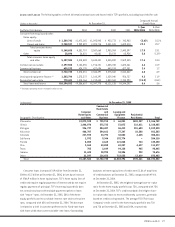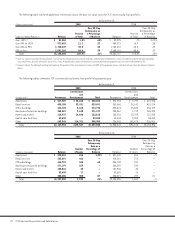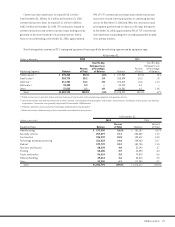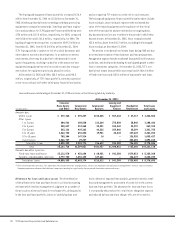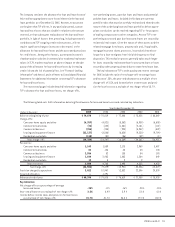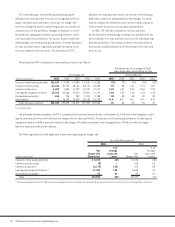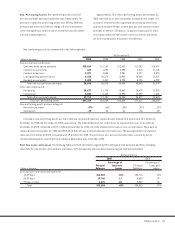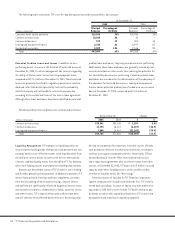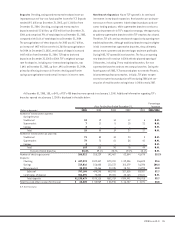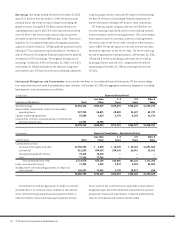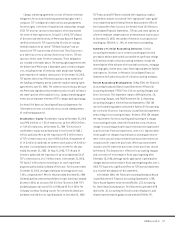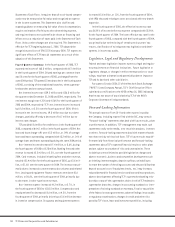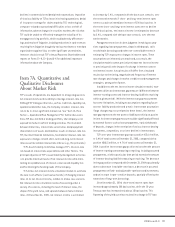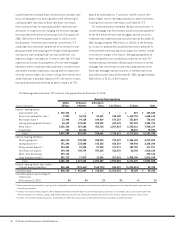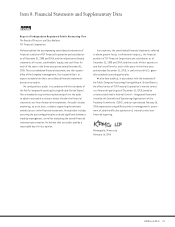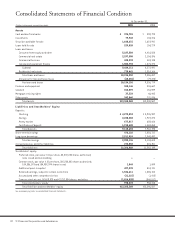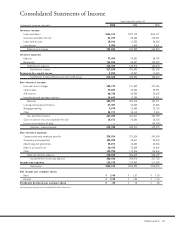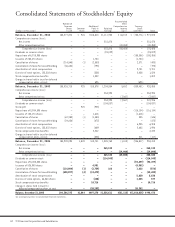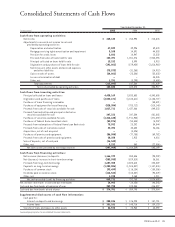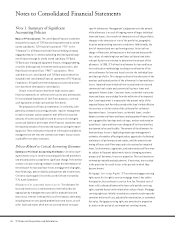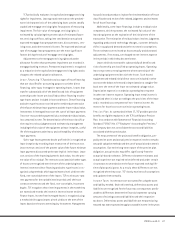TCF Bank 2005 Annual Report Download - page 57
Download and view the complete annual report
Please find page 57 of the 2005 TCF Bank annual report below. You can navigate through the pages in the report by either clicking on the pages listed below, or by using the keyword search tool below to find specific information within the annual report.
372005 Form 10-K
Campus marketing agreements consist of fixed or minimum
obligations for exclusive marketing and naming rights with 11
campuses. TCF is obligated to make various annual payments
for these rights in the form of royalties and scholarships through
2023. TCF also has various renewal options which may extend
the terms of these agreements. On April 21, 2005, TCF’s Board
of Directors and the University of Minnesota Board of Regents
ratified contracts for TCF’s sponsorship of a new on-campus
football stadium to be called “TCF Bank Stadium” and an
extension of TCF’s sponsorship of the U Card. The U Card serves
as a key for access to a variety of university services. TCF also
sponsors similar cards for other campuses. These obligations
are included in the table above. The naming rights agreement with
the University of Minnesota is dependent upon several contingen-
cies, including receipt of necessary state and private funding
and completion of stadium construction. On December 22, 2005,
TCF and the University of Minnesota announced an extension of
the funding contingency period under the stadium naming rights
agreement to June 30, 2006. The extension was necessary because
the Minnesota Legislature has not taken action on a bill to finance
the state’s portion of the stadium’s cost. Campus marketing agree-
ments are an important element of TCF’s campus banking strategy.
See Note 19 of Notes to Consolidated Financial Statements for
information on loans serviced with recourse and standby letters
of credit and guarantees.
Stockholders’ Equity Stockholders’ equity at December 31, 2005
was $998.5 million, or 7.5% of total assets, up from $958.4 million,
or 7.8% of total assets, at December 31, 2004. The increase in
stockholders’ equity was primarily due to net income of $265.1
million, partially offset by the repurchase of 3.5 million shares
of TCF’s common stock at a cost of $93.5 million, the payment of
$114.5 million in dividends on common stock and a $19.8 million
decrease in accumulated comprehensive income for the year
ended December 31, 2005. On May 21, 2005, TCF’s Board of
Directors authorized the repurchase of up to an additional 5% of
TCF’s common stock, or 6.7 million shares. At December 31, 2005,
TCF had 6.7 million shares remaining in its stock repurchase
programs authorized by its Board of Directors. For the year ended
December 31, 2005, average total equity to average assets was
7.43%, compared with 7.94% for the year ended December 31, 2004.
Dividends paid to common shareholders on a per share basis totaled
85 cents in 2005, an increase of 13.3% from 75 cents in 2004. TCF’s
dividend payout ratio was 42.5% in 2005 and 40.3% in 2004. The
Company’s primary funding sources for common dividends are
dividends received from its subsidiary bank. At December 31, 2005,
TCF Financial and TCF Bank exceeded their regulatory capital
requirements and are considered “well-capitalized” under guide-
lines established by the Federal Reserve Board and the Office of
the Comptroller of the Currency. See Notes 14 and 15 of Notes to
Consolidated Financial Statements. TCF has used stock options as
a form of employee compensation to a limited extent in prior years.
At December 31, 2005, the number of incentive stock options out-
standing was 259,800, or .19%, of total shares outstanding.
Summary of Critical Accounting Estimates Critical
accounting estimates occur in certain accounting policies and
procedures and are particularly susceptible to significant change.
Policies that contain critical accounting estimates include the
determination of the allowance for loan and lease losses, mortgage
servicing rights, income taxes, lease financings and pension liability
and expenses. See Note 1 of Notes to Consolidated Financial
Statements for further discussion of critical accounting estimates.
Recent Accounting Developments In May 2005, the Financial
Accounting Standards Board issued Statement of Financial
Accounting Standard (“SFAS”) No. 154, Accounting Changes and
Error Corrections. This Statement replaces APB Opinion No. 20,
Accounting Changes, and FASB Statement No. 3, Reporting
Accounting Changes in Interim Financial Statements. SFAS 154
carries forward the guidance contained in Opinion 20 for reporting
the correction of an error in previously issued financial statements
and a change in accounting estimate. However, SFAS 154 changes
the requirements for the accounting and reporting of a change
in accounting principle. Under this Statement, every voluntary
change in accounting principle requires retrospective application
to prior periods’ financial statements, unless it is impracticable.
It also applies to changes required by an accounting pronounce-
ment in the unusual instance that the pronouncement does not
include specific transition provisions. When a pronouncement
includes specific transition provisions, those provisions should
be followed. This Statement is effective for accounting changes
and corrections of errors made in fiscal years beginning after
December 15, 2005, although earlier application is permitted for
changes and corrections made in fiscal years beginning after June 1,
2005. TCF expects no significant effect on TCF financial statements
as a result of the adoption of this statement.
In December 2004, the Financial Accounting Standards Board
issued Statement of Financial Accounting Standard No. 123R,
Share-Based Payment which revised SFAS No. 123, Accounting
for Stock-Based Compensation. This Statement supersedes APB
Opinion No. 25, Accounting for Stock Issued to Employees, and
related implementation guidance and amends SFAS No. 95,


